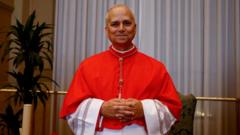Pope Leo XIV's election comes at a critical juncture for the Catholic Church, as he faces the challenge of deciding between continuity with Pope Francis's inclusive vision or paving a new path in his papacy.
Pope Leo XIV: The First American Pontiff and Its Implications

Pope Leo XIV: The First American Pontiff and Its Implications
The election of Pope Leo XIV marks a historic moment for the Catholic Church, as the first U.S. pope may reshape the church's global stance.
The Roman Catholic Church has embraced a pivotal moment as the 267th pontiff, Robert Francis Prevost, popularly known as Pope Leo XIV, was elected on Thursday following a two-day conclave in Rome. This choice is significant as it marks the first time a pope has emerged from the United States, challenging traditional norms surrounding papal elections. The decision was reached by the collective of 133 cardinals who voted, generating a plume of white smoke that signaled the conclusion of their deliberations.
Born in Chicago and a polyglot at 69 years of age, Pope Leo XIV has a rich background that spans continents. He spent two decades in Peru, where he not only became a respected bishop but also acquired Peruvian citizenship. This global perspective combined with his role as a high-ranking official in the Vatican, where he administered the selection of bishops worldwide, positions him uniquely to address the pressing issues facing the Church.
He shares a commitment to social justice with his predecessor, Pope Francis, focusing efforts toward helping the underprivileged and advocating for inclusivity. According to remarks he made to the Vatican's official news platform, he envisions a leadership role that demands humility and genuine connection with the communities he serves, stepping away from a 'little prince' mentality.
The cardinals' conclave, notable for being the largest ever, faced challenges in reaching a consensus due to differing opinions on the Church's trajectory, reflecting various factions' concerns about the future. With the legacy of Pope Francis, who advocated for inclusiveness and reform until his recent passing, the church now looks to Pope Leo XIV as he navigates the delicate balance between continuity and change.
The implications of Pope Leo XIV's election could resonate widely, both within the Church and in international affairs, as the Catholic Church continues to influence social and political discourse across the globe.
Born in Chicago and a polyglot at 69 years of age, Pope Leo XIV has a rich background that spans continents. He spent two decades in Peru, where he not only became a respected bishop but also acquired Peruvian citizenship. This global perspective combined with his role as a high-ranking official in the Vatican, where he administered the selection of bishops worldwide, positions him uniquely to address the pressing issues facing the Church.
He shares a commitment to social justice with his predecessor, Pope Francis, focusing efforts toward helping the underprivileged and advocating for inclusivity. According to remarks he made to the Vatican's official news platform, he envisions a leadership role that demands humility and genuine connection with the communities he serves, stepping away from a 'little prince' mentality.
The cardinals' conclave, notable for being the largest ever, faced challenges in reaching a consensus due to differing opinions on the Church's trajectory, reflecting various factions' concerns about the future. With the legacy of Pope Francis, who advocated for inclusiveness and reform until his recent passing, the church now looks to Pope Leo XIV as he navigates the delicate balance between continuity and change.
The implications of Pope Leo XIV's election could resonate widely, both within the Church and in international affairs, as the Catholic Church continues to influence social and political discourse across the globe.























